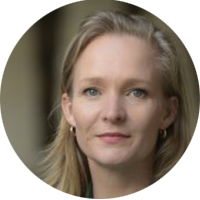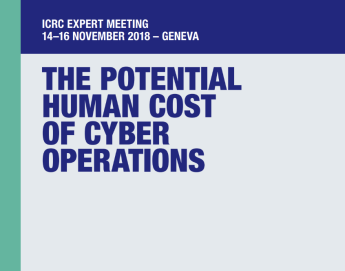
Global Advisory Board on digital threats during conflict
Warfare is changing. The use of cyber operations and other digital technologies has become a reality of today's armed conflicts. While technological advances can have positive applications for the protection of civilians in armed conflict, new means and methods of warfare and the way they are employed can also pose new threats to civilians, combatants, and humanitarian organizations. They can also challenge the application and implementation of international humanitarian law.
To identify concrete ways to protect populations from digital threats linked to the digitalization of armed conflicts, the ICRC's President has convened a multidisciplinary group of legal, military, policy and technological leaders.
The ICRC's Global Advisory Board has focused on cyber and other digital threats civilians face during armed conflicts.
Protecting civilian infrastructure against hostile cyber operations during armed conflict
As societies are becoming increasingly digitalized and interconnected, the risk of cyber operations causing harm to humans is increasing.
Cyber operations over the past decade – whether conducted during or outside armed conflicts – have posed a real risk to the provision of essential services to the civilian population, including medical, electrical, water, and sanitation, or nuclear facilities. These operations pose a real risk of harm to humans.

Protecting civilians against harmful consequences of information operations during armed conflict
The rapid evolution and increasing use of digital information technologies is turning misinformation, disinformation, and hate speech into an exacerbating and accelerating driver of conflict dynamics, violence, and harm to civilians.
Misinformation, disinformation, and hate speech can contribute directly or indirectly to adverse humanitarian consequences, for instance by inciting physical violence (such as through hate speech against minority groups).
Misinformation, disinformation, and hate speech can contribute directly or indirectly to adverse humanitarian consequences, for instance by inciting physical violence (such as through hate speech against minority groups).
Risks when civilians are drawn into digital military operations
The digitalization of societies has created a dramatic increase in the number of civilians – individuals, groups, companies - taking part in digital operations related to an armed conflict, and civilian digital infrastructure is increasingly used for military purposes.
This trend leads to a reality in which the fundamental distinction between what is civilian and what is military risks becoming blurred, exposing civilians and civilian infrastructure to a greater risk of harm.
Protecting the ability of humanitarian organization to provide life-saving services
Cyber operations and disinformation campaigns against humanitarian organizations can weaken their operations and institutions in a global context marked by staggering needs and an insufficient humanitarian response capacity.
Such threats can exacerbate the needs of people affected by conflict and cause significant civilian harm, including through the unauthorized access to humanitarian data.
The ICRC also sought experts' expertise on other emerging cyber threats and digital risks. These include the increasing use of automatization and of artificial intelligence in cyber and information operation, new humanitarian risks linked to the exponential growth of the 'internet of things', and the multiplication of threat actors in the digital space.
The ICRC's Global Advisory Board has adopted a joint report presenting four guiding principles and a set of concrete recommendations to belligerents, states, tech companies, and humanitarian organizations to prevent or mitigate digital threats to civilian populations.
Members of the ICRC's Global Advisory Board on Digital Threats
Dapo Akande — Professor of Public International Law, & Co-Director, Oxford Institute for Ethics, Law and Armed Conflict, the Blavatnik School of Government, Oxford University
 Dapo Akande is Professor of Public International Law at the Blavatnik School of Government, University of Oxford, where he is also Director of the Oxford Institute for Ethics, Law and Armed Conflict. He has held visiting professorships in the US and Europe, including at Yale Law School. He was on the International Group of Experts for the Tallinn Manual 2.0 on International Law Applicable to Cyber Operations and is a leader of the Oxford Process on International Law and Cyber Operations.
Dapo Akande is Professor of Public International Law at the Blavatnik School of Government, University of Oxford, where he is also Director of the Oxford Institute for Ethics, Law and Armed Conflict. He has held visiting professorships in the US and Europe, including at Yale Law School. He was on the International Group of Experts for the Tallinn Manual 2.0 on International Law Applicable to Cyber Operations and is a leader of the Oxford Process on International Law and Cyber Operations.
He is one of the authors of the Oppenheim's International Law: The United Nations (2017, OUP) which was awarded the Certificate of Merit by the American Society of International Law, and an editor of the Oxford Guide to International Humanitarian Law (2020). He has been a member of the Editorial or Advisory Boards of several journals including the American Journal of International Law, the European Journal of International Law, and the African Journal of International and Comparative Law.
He is the founding editor of the scholarly blog: EJIL:Talk! the blog of the European Journal of International Law. He has acted as adviser on international law issues to United Nations bodies, the African Union Commission, the Commonwealth Secretariat, the Association of South-East Asian Nations, as well as to States and non-governmental organizations.
He has acted as advocate, counsel or adviser/expert in cases before international and national tribunals, including the International Court of Justice, the International Tribunal for the Law of the Sea, the European Court of Human Rights, international arbitral tribunals, World Trade Organization and North American Free Trade Area Dispute Settlement panels, and the UK Supreme Court. He served as legal adviser to the UK Parliament's All-Party Parliamentary Group on Drones.
Mariana Salazar Albornoz, Rapporteur for Data Protection and for International Law applicable to Cyberspace, Interamerican Juridical Committee – OAS
 Mariana Salazar Albornoz is a member of the Inter-American Juridical Committee of the OAS (2019-2022), where she is Rapporteur for Data Protection and for International Law Applicable to Cyberspace.
Mariana Salazar Albornoz is a member of the Inter-American Juridical Committee of the OAS (2019-2022), where she is Rapporteur for Data Protection and for International Law Applicable to Cyberspace.
She is a professor of International Humanitarian Law, International Criminal Law and Public International Law at Universidad Iberoamericana in Mexico City. She is also the Academic Programs Associate at the Auschwitz Institute for the Prevention of Genocide and Mass Atrocities (since 2019).
From 2005 to 2018 she worked at the Ministry of Foreign Affairs of Mexico, where she was Coordinator of Public International Law and, previously, Director of International Humanitarian and Criminal Law and of Economic, Social, and Cultural Rights.
She was the Technical Secretary of Mexico's Inter-Ministerial Committee on International Humanitarian Law (2010-2016) and Mexico's Focal Point to the Latin American Network on Genocide and Mass Atrocity Prevention (2012-2018) and to the Global Network for Responsibility to Protect (2018).
A former practitioner in law firms in Mexico City, Ms. Salazar holds a Law Degree from Universidad Iberoamericana (2001) and a Master's Degree in International Law from the Graduate Institute of International Studies in Geneva (2004). She writes on issues of international law, atrocity prevention, armed conflict and human rights and is a member of the International Law Association, of the Mexican Council on Foreign Relations, and of the Editorial Board for the International Review of the Red Cross.
Brigadier General (Ret) A.J. Coetzee, South African National Defence Forces
 Brigadier General (Ret) A.J. Coetzee retired in 2019 after 40 years' service in the South African Defence Force and since 1994 the South African National Defence Force.
Brigadier General (Ret) A.J. Coetzee retired in 2019 after 40 years' service in the South African Defence Force and since 1994 the South African National Defence Force.
During his career he was deployed in various posts from formal training, operational- and staff posts.
Brig Gen (Ret) Coetzee was involved in Information Warfare from 1997 when he was appointed as the Second in Command of the SA Army Electronic Warfare Regiment, responsible for planning and coordinating Communication Intelligence Operations. He was later appointed as the Officer Commanding of the Electronic Warfare Regiment.
In January 2003 the then Colonel Coetzee was appointed in the post of Senior Staff Officer Information Warfare responsible for Information Warfare Governance which included the development of the Information Warfare Philosophy, Strategy, Policy and Master Plan. He was then also responsible for the Electronic Warfare (EW) and Philological Operations (PsyOps) Portfolio. His responsibility also included the coordination of the development of EW and PsyOps technology to be utilized in operations.
In 2009 he was appointed in the post of Director Information Warfare and promoted to the rank of Brigadier General. He was then responsible for Electronic Warfare and Philological Operations and an additional portfolio, Cyber which has become a very prominent focus in the development of the Information Warfare domain. Until retirement, he was responsible for providing Information Warfare governance to the SANDF and technology development for Electronic Warfare, Network Warfare (Cyber) and Psychological Operations in the SANDF.
Vice Admiral (rt) Arnaud Coustillière, Cyber and Digital Senior Advisor, Str@t-Algo
 Vice-Admiral Arnaud Coustilliere left active service on 31 August 2020 after a long career devoted to maritime and digital operations.
Vice-Admiral Arnaud Coustilliere left active service on 31 August 2020 after a long career devoted to maritime and digital operations.
He left a strong imprint on the Ministry of the Armed Forces as first COMCYBER (2011/2017) and first Global Ministry Digital/CIO (2017/2020).
He is currently a Cyber & Digital Senior Advisor to various clusters, organizations and companies; he is particularly dedicated to the promotion of digital trust and the various aspects of cyber defence. In addition to an onboard maritime career marked by the command of several warships, he has devoted more than twenty years to modernizing the Ministry of the Armed Forces' cyber information and digital systems.
In particular, he was the Navy's CIO from 2006 to 2008, then in charge from 2009 to 2011 of the creation and ramp-up of the armies' Cyber Defence capabilities, then its first commander from 2011 to 2017 (COMCYBER). Finally, from 2017 to 2020 he created the DGNUM: a veritable "Group CIO" responsible for IT and project governance, ministerial administration of the Ministry's data, steering its digital security and orchestrating its digital transformation through several major reorganization's.
Camille François, Chief Innovation Officer, Graphika
 Camille François works on the impacts of technology on society, with an emphasis on cyber conflict and information operations. She currently serves as the Chief Innovation Officer at Graphika where she oversees its investigation, analyses and R&D teams and leads the company's work to detect and mitigate disinformation, media manipulation and harassment.
Camille François works on the impacts of technology on society, with an emphasis on cyber conflict and information operations. She currently serves as the Chief Innovation Officer at Graphika where she oversees its investigation, analyses and R&D teams and leads the company's work to detect and mitigate disinformation, media manipulation and harassment.
She was previously a Principal Researcher at Google, in the "Jigsaw" team, an innovation unit that builds technology to address global security challenges and protect vulnerable users. Camille has advised governments and parliamentary committees on both sides of the Atlantic, investigated Russian interference in the 2016 Presidential election on behalf of the US Senate Select Intelligence Committee, and served as a special advisor to the Chief Technology Officer of France.
She is an affiliate scholar of the Harvard Berkman-Klein Center for Internet and Society, a Fulbright scholar and a Mozilla Fellow. She holds a masters degree in human rights from the French Institute of Political Sciences (Sciences-Po) and a masters degree in international security from the School of International and Public Affairs (SIPA) at Columbia University.
Camille was distinguished by the MIT Tech Review in the prestigious "35 Innovators Under 35" annual award in the "Visionary" category for her work leveraging data science to detect and analyze deceptive campaigns at scale. She was also distinguished by TIME magazine as one of the 100 next most influential people in the world, for her work protecting open societies from the threat of disinformation.
Tom Burt, Corporate Vice President - Customer Security & Trust (CST), Microsoft
 Tom leads a cross-disciplinary team that works to improve customer trust in the safety and security of the digital ecosystem by advocating for global cybersecurity policy, partnering with public agencies and private enterprises to disrupt nation-state cyberattacks and support deterrence efforts, and combatting cybercrime.
Tom leads a cross-disciplinary team that works to improve customer trust in the safety and security of the digital ecosystem by advocating for global cybersecurity policy, partnering with public agencies and private enterprises to disrupt nation-state cyberattacks and support deterrence efforts, and combatting cybercrime.
CST is also responsible for responding to law enforcement requests for access to data while protecting customer privacy, advocating for data access policy and managing Microsoft’s government clearance and national security compliance.
In addition to his work at Microsoft, Tom races sports cars and participates in musical theater.
Marina Kaljurand, Member of the EU Parliament for Estonia, Former Minister of Foreign Affairs for Estonia
 Kaljurand was elected to the European Parliament and started her duties as MEP on July 2nd, 2019 after resigning from the Estonian Parliament (Riigikogu). She is a member of the Estonian Social Democrats Party since June 2018. Kaljurand is the member of the UN Secretary General's Advisory Board on Disarmament Matters since 2020.
Kaljurand was elected to the European Parliament and started her duties as MEP on July 2nd, 2019 after resigning from the Estonian Parliament (Riigikogu). She is a member of the Estonian Social Democrats Party since June 2018. Kaljurand is the member of the UN Secretary General's Advisory Board on Disarmament Matters since 2020.
Kaljurand was a member of the UN Secretary General's High Level Panel on Digital Cooperation (2018-2019). She is the Commissioner of the Global Commission of the Stability of Cyberspace (GCSC) that she chaired (in 2017-2019) until she was elected to the Estonian Parliament. Kaljurand served as Estonian Foreign Minister in 2015-2016.
Kaljurand has served twice as the Estonian National Expert at the United Nations Group of Governmental Experts on Developments in the Field of Information and Telecommunications in the Context of International Security (GGE), in 2014-2015 and in 2016-2017. She began her career at the Ministry of Foreign Affairs in 1991 and held several leadership positions, including Undersecretary for Legal and Consular Affairs (Legal Adviser), Undersecretary for Trade and Development Cooperation, Undersecretary for Political Affairs.
She served as Ambassador of Estonia to the State of Israel, the Russian Federation, Kazakhstan, Mexico, Canada and the United States of America. Kaljurand headed the legal working group at the Estonian accession negotiations to the European Union and was the Chief Negotiator in Estonian accession negotiations to the OECD. Marina Kaljurand graduated cum laude from Tartu University (1986, LLM). She has a professional diploma from the Estonian School of Diplomacy (1992) and MA from the Fletcher School of Law and Diplomacy, Tufts University (F95).
Irene Khan, United Nations Special Rapporteur for the promotion and protection of the right to freedom of opinion and expression
 Irene Khan is the first woman to be appointed as UN Special Rapporteur for Freedom of Opinion and Expression. An internationally recognized advocate for human rights, gender equality and social justice, she teaches at the Graduate Institute of International and Development Studies in Geneva, and is co-author of The Unheard Truth: Poverty and Human Rights.
Irene Khan is the first woman to be appointed as UN Special Rapporteur for Freedom of Opinion and Expression. An internationally recognized advocate for human rights, gender equality and social justice, she teaches at the Graduate Institute of International and Development Studies in Geneva, and is co-author of The Unheard Truth: Poverty and Human Rights.
She was the Secretary-General of Amnesty International from 2001 to 2009 and Director-General of the International Development Law Organization (IDLO) from 2010 to 2019.
Xiaodong Lee, Founder and CEO, Fuxi Institution, Vice Chairman of Internet Society of China, Research Professor of Chinese Academy of Sciences, Adjunct Professor of Tsinghua University
 Dr. Xiaodong Lee, Founder and CEO of Fuxi Institution, Vice Chairman of Internet Society of China, Former CEO of China Internet Network Information Center (CNNIC), former Vice President of Internet Corporation for Assigned Names and Numbers (ICANN).
Dr. Xiaodong Lee, Founder and CEO of Fuxi Institution, Vice Chairman of Internet Society of China, Former CEO of China Internet Network Information Center (CNNIC), former Vice President of Internet Corporation for Assigned Names and Numbers (ICANN).
YGL and Member of Global Future Council of World Economic Forum (WEF), Commissioner of the Global Commission on the Stability of Cyberspace (GCSC), Commissioner of Global Information Infrastructure Commission (GIIC), Research Professor and Director, ICT Laboratory for Internet Infrastructure, Chinese Academy of Sciences; Director of Center for Internet Governance and adjunct Professor of School of Public Policy and Management, Tsinghua University.
Doris Leuthard, former President and Federal Councillor of the Swiss Confederation, Switzerland
 Doris Leuthard is currently working in the private sector as a member of the Boards of the Coop Group, Bell Food Group, Transgourmet International and Stadler Rail. In addition, she is President of the Ulrico Hoepli Foundation, Co-President of the Steering Committee of the Europa Forum Luzern, President of the Swiss Digital Initiative, Member of the ETH Foundation and Member of the Kofi Annan Foundation.
Doris Leuthard is currently working in the private sector as a member of the Boards of the Coop Group, Bell Food Group, Transgourmet International and Stadler Rail. In addition, she is President of the Ulrico Hoepli Foundation, Co-President of the Steering Committee of the Europa Forum Luzern, President of the Swiss Digital Initiative, Member of the ETH Foundation and Member of the Kofi Annan Foundation.
A Swiss national, Doris Leuthard studied law at the University of Zurich and is a qualified attorney at law. Following a career spanning several years in the private sector, she was elected in 1999 to the Swiss National Council. She presided over the Christian Democratic People's Party from 2004 to 2006.
From 2006 to 2018, she was a member of the Swiss Federal Council. In 2009 and 2016, she was elected Vice-President of the Confederation. She was elected President of the Confederation for 2010 and 2017. From 2006 until 2010, she was head of the Federal Department of Economic Affairs. In that function, she was Governor at the World Bank and represented Switzerland at different institutions such as the OECD, ILO, FAO and WTO.
From 2010 until 2018, she was head of the Federal Department of Environment, Transport, Energy and Communications. In that function, she represented Switzerland at different institutions such as UNEP, IGF, OECD, WEF, the Paris climate negotiations and transports and digital conferences. From 2018 until 2019, she was a member of the UN High-level Panel on Digital Cooperation.
Dr. Patricia Lewis, Research Director, Conflict, Science & Transformation; Director, International Security Programme at Chatham House in London
 Dr. Patricia M. Lewis is the Research Director for Conflict, Science & Transformation and the Director of the International Security Programme at Chatham House in London.
Dr. Patricia M. Lewis is the Research Director for Conflict, Science & Transformation and the Director of the International Security Programme at Chatham House in London.
Her former posts include Deputy Director and Scientist-in-Residence at the Center for Nonproliferation Studies at the Monterey Institute; Director of the United Nations Institute for Disarmament Research (UNIDIR); and Director of VERTIC.
Dr. Lewis served on the 2004-6 WMD Commission, chaired by Dr Hans Blix, the 2010-2011 Advisory Panel on Future Priorities of the OPCW, chaired by Ambassador Rolf Ekeus, and was an Advisor to the 2008-10 International Commission on Nuclear Non-proliferation and Disarmament (ICNND) chaired by Gareth Evans and Yoriko Kawaguchi.
She was a Commissioner on the 2014-2016 Global Commission on Internet Governance chaired by Carl Bildt and is on the EEAS Space Advisory Board (SAB) as a Senior Space Advisor to the EU Special Envoy for Space.
She sits on the SIPRI Governing Board, the UK Chapter of Women of Color Advancing Peace, Security and Conflict Transformation's (WCAPS) Inaugural Advisory Board, the University of Birmingham Foresight Strategic Research Themes Group and the Open University AstrobiologyOU External Advisory Board.
She holds a BSc (Hons) in physics from Manchester University, a PhD in nuclear physics from Birmingham University and an Honorary Doctor of Laws from the University of Warwick and is the recipient of the American Physical Society's 2009 Joseph A. Burton Forum Award recognizing 'outstanding contributions to the public understanding or resolution of physics'. Dr Lewis is a dual national of the UK and Ireland.
Mirjana Spoljaric Egger (Chairperson), President of the International Committee of the Red Cross
 Ms. Mirjana Spoljaric Egger is President of the International Committee of the Red Cross (ICRC), commencing in October 2022.
Ms. Mirjana Spoljaric Egger is President of the International Committee of the Red Cross (ICRC), commencing in October 2022.
Prior to taking up the Presidency, from August 2018 Ms. Spoljaric served as the United Nations Assistant Secretary-General, Assistant Administrator of the UN Development Programme (UNDP), and Director of the Regional Bureau for Europe and the CIS.
Ms. Spoljaric previously had many years of distinguished service with the Swiss Diplomatic Corps. More recently she served as Ambassador and Head of the United Nations and International Organisations Division, where she was instrumental in shaping coherent Swiss policies and priorities in all main UN organs and conferences, representing Switzerland in multilateral processes, and had responsibility for International Geneva and Switzerland's host country policy.
Ms. Spoljaric served in several assignments in the Swiss Federal Department of Foreign Affairs in Bern, and as Counsellor and Head of the Political Team at the Permanent Mission of Switzerland to the United Nations in New York.
From 2010-2012, Ms. Spoljaric was seconded to the Office of the Commissioner-General of the UN Relief and Works Agency for Palestine Refugees in the Near East (UNRWA) as Senior Adviser covering organizational development, management reforms, and external relations.
Earlier in her career Ms. Spoljaric worked in the Embassy of Switzerland in Cairo, Egypt, and was Desk Officer at the Foreign Economic Affairs Directorate (International Finance Institutions) of the State Secretariat for Economic Affairs (SECO).
Ms. Spoljaric studied Philosophy, Economics and International Law at the Universities of Basel and Geneva and holds a master's degree. From 2004 – 2006 she was part-time lecturer on Global Governance at the University of Lucerne.
Elina Noor, Senior Fellow, Asia Program, Carnegie Endowment for International Peace
 Elina Noor is Director, Political-Security Affairs and Deputy Director, Washington, D.C. Office at the Asia Society Policy Institute. A native of Malaysia, Elina's work focuses on security developments in Southeast Asia, global governance and technology, and preventing/countering violent extremism.
Elina Noor is Director, Political-Security Affairs and Deputy Director, Washington, D.C. Office at the Asia Society Policy Institute. A native of Malaysia, Elina's work focuses on security developments in Southeast Asia, global governance and technology, and preventing/countering violent extremism.
Previously, Elina was Associate Professor at the Daniel K. Inouye Asia-Pacific Center for Security Studies. Prior to that, she was Director, Foreign Policy and Security Studies at the Institute of Strategic and International Studies Malaysia. While there, she also served as the Secretary of the Council for Security Cooperation in the Asia Pacific, a 21-member Track Two regional security network.
Between 2017 and 2019, Elina was a member of the Global Commission on the Stability of Cyberspace. She is also on the United Nations Office of Disarmament Affairs' roster of experts, supporting efforts to build member states' cyber-related capacity.
Elina read law at Oxford University. She obtained an LL.M (Public International Law) from The London School of Economics and Political Science, University of London, graduating with distinction at the top of her class. A recipient of the Perdana (Malaysian Prime Minister's) Fellowship, she also holds an MA in Security Studies from Georgetown University where she was a Women in International Security Scholar.
Dr. Gulshan Rai, Former National Cyber Security Coordinator, Government of India in the Office of Prime Minister of India
Dr. Gulshan Rai holds an M.Tech and Doctoral degree in electronics. He has over 35 years of experience in different areas of Information Technology which include different aspects of e-Governance, cyber security, cyber laws, and several related fields covering policies and operations. Several international cooperation agreements have been entered under his leadership.
He led the Government teams to United Nations to negotiate "norms of behaviour in Cyber Space, Internet domain and WTO. He is on the global board of the United States India Business Council and on the Board of several Indian IT companies and Chairman of the company set by the government of India to set up incubation centres and manage innovation fund.
He has been the first National Cyber Security Coordinator, Government of India in the Office of Prime Minister of India. Prior to that he was in the Ministry of Electronics & Information Technology.
He led a team from time to time to draft and bring out National Policies in cyber security and cyber laws and set up National Watch and Alert System in the country as part of cyber security initiative and Computer Emergency Team. He was also the first and founding Director-General, CERT-In (Indian Computer Emergency Response Team) handling cyber incidents in India and headed E-Security & Cyber Law Division and other Divisions in the Ministry of Electronics, Govt. of India.
He has led the team to put in 2nd Technological Legislation in India, the Information Technology Act, 2000 and the 1st Data Privacy Framework of India. Such frameworks feed to other legislations in India.
He was instrumental in the establishment of the first large-scale education and research network in close collaboration with the leading educational and research institutions in the country. He has been leading team, designing, and implementing IT solutions in the areas of Finance, Taxes and Law & Order.
Dmitry Samartsev, CEO, BI.ZONE
 Dmitry is the head of BI.ZONE — an expert in strategic management of digital risks that helps organisations around the world to develop their business safely in the digital age. The company prepares individual strategies for complex projects based on 40+ of its own services and products as well as offers simple and automated solutions for small teams. Since the foundation in 2016, BI.ZONE has implemented over 700 projects in finance, telecommunications, energy, aviation and many others.
Dmitry is the head of BI.ZONE — an expert in strategic management of digital risks that helps organisations around the world to develop their business safely in the digital age. The company prepares individual strategies for complex projects based on 40+ of its own services and products as well as offers simple and automated solutions for small teams. Since the foundation in 2016, BI.ZONE has implemented over 700 projects in finance, telecommunications, energy, aviation and many others.
Prior to joining BI.ZONE, Dmitry founded Treatface — an information technology company, and was Vice President for Technology Development at INLINE Technologies — a versatile IT integrator.
Every year, Dmitry takes part in the executive management programmes at Stanford University. He holds a master's degree in Information Technology and a degree in Economics (World Economy Department).
Marietje Schaake, International Policy Director at Stanford University Cyber Policy Center; International Policy Fellow at Stanford's Institute for Human-Centered Artificial Intelligence; President of the Cyber Peace Institute
 Marietje Schaake is the international policy director at Stanford University's Cyber Policy Center and international policy fellow at Stanford's Institute for Human-Centered Artificial Intelligence. She was named President of the Cyber Peace Institute.
Marietje Schaake is the international policy director at Stanford University's Cyber Policy Center and international policy fellow at Stanford's Institute for Human-Centered Artificial Intelligence. She was named President of the Cyber Peace Institute.
Between 2009 and 2019, Marietje served as a Member of the European Parliament for the Dutch liberal democratic party where she focused on trade, foreign affairs and technology policies. Marietje is affiliated with a number of non-profits including the European Council on Foreign Relations and the Observer Research Foundation in India and writes a monthly column for the Financial Times and a bi-monthly column for the Dutch NRC newspaper.
Johanna Weaver, Director, Tech Policy Design Centre, Australian National University
 Professor Johanna Weaver is the founding Director of the Tech Policy Design Centre at the Australian National University.
Professor Johanna Weaver is the founding Director of the Tech Policy Design Centre at the Australian National University.
In June 2021, Professor Weaver completed her term as Australia's independent expert and lead negotiator on cyber issues at the United Nations. In this role she engaged with governments, industry, and civil society to shape national and international tech regulation. Earlier, Professor Weaver led the Cyber Affairs Branch at the Australian Department of Foreign Affairs and Trade, working closely with Australia's inaugural Ambassador for Cyber Affairs.
Professor Weaver is a former diplomat, a reformed commercial litigator, and an unapologetic international law nerd. Proudly neurodiverse herself, Professor Weaver is a passionate advocate for diversity and inclusion.
Marcus Willett, Senior Cyber Adviser, International Institute for Strategic Studies
 Marcus has extensive experience in advising governments and companies on cyber, in the UK and internationally. In a 33-year career at the UK's Government Communications Head Quarters (GCHQ), Marcus rose to become the deputy head of the organisation.
Marcus has extensive experience in advising governments and companies on cyber, in the UK and internationally. In a 33-year career at the UK's Government Communications Head Quarters (GCHQ), Marcus rose to become the deputy head of the organisation.
He was GCHQ's first Director Cyber and has led several major UK government cyber initiatives. He has also held posts across the wider UK intelligence and security community. Since leaving government service in 2018, Marcus has been the senior cyber adviser to the International Institute for Strategic Studies, a world-leading authority on global security, political risk and military conflict. He also advises a range of companies in the UK and elsewhere on cybersecurity.




